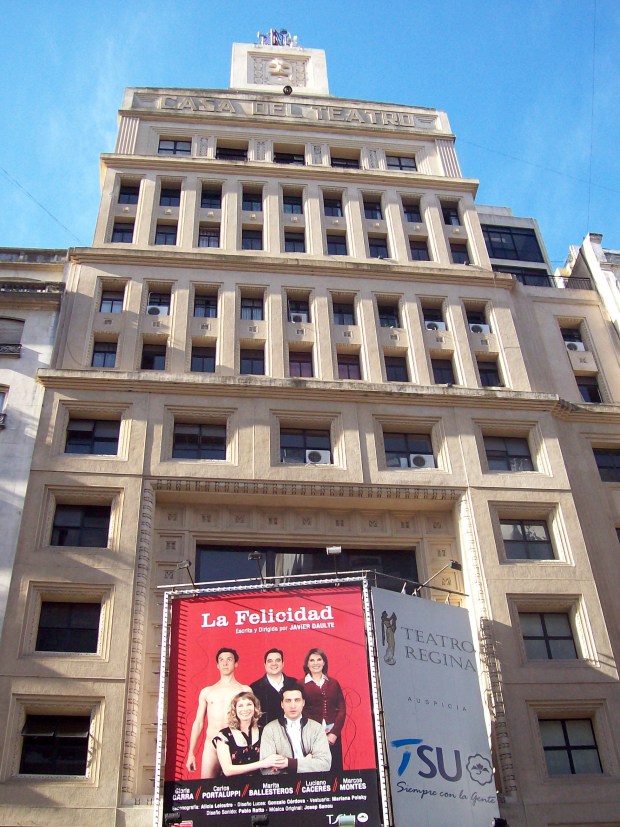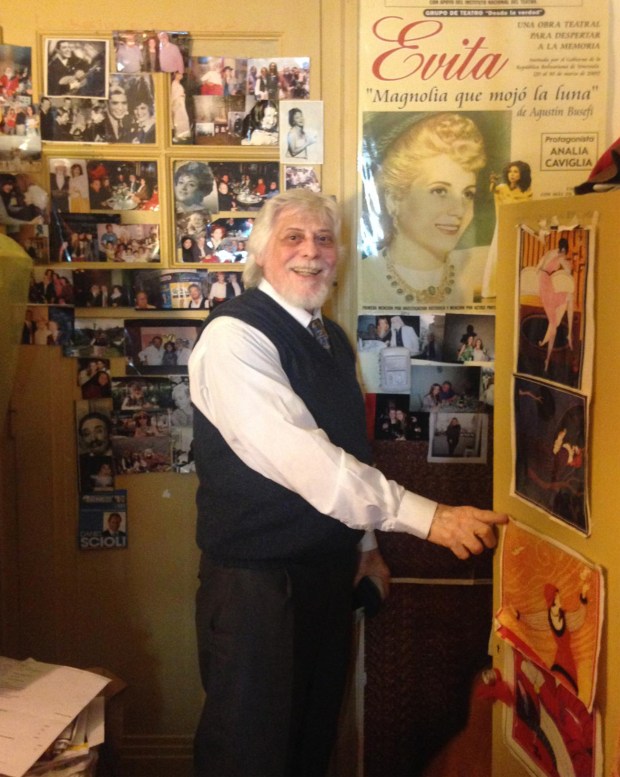On Avenida Santa Fe, in the heart of Buenos Aires’s European quarter, there stands a house with marble floors and wood-paneled walls. An oil painting of Regina Pacini—the lyric soprano who married Argentine President Marcelo Torcuato de Alvear in 1907—hangs in a room off the front hall. Faded ivory gowns hang on racks and the air is thick with the smell of leather books. Black-and-white glamor shots, many signed, of Argentina’s greatest luminaries line the back wall.
Then you go upstairs.
The bare, narrow rooms of the Casa del Teatro—Buenos Aires’s long-running nursing home for impoverished actors and musicians—look nothing like the sumptuous ground floor. Those lights that are still on are jaundiced; the doors are paint-chipped and uniform, their only difference coming from handwritten scrawls left by inhabitants: I will not have breakfast today. Nurses walk silently; the elevator creaks.
For the 45 or so actors—and the odd playwright or tango singer—who live here at the Casa del Teatro, it could be a lot worse. Those who are permitted to stay at the Casa del Teatro—founded in 1938 by Regina Pacini, allegedly after she saw her old violin teacher begging for spare change on the street—must make less than 350 pesos a month and be over 60 years old to be granted refuge here.
Some, like the tango singer Nelly Vásquez, were famous. Others, like the actor Enrique Mazza, found limited success. Nevertheless, steps from the leafy promenades and Parisian-style cafés of the Recoleta quarter, everyone here is united in one way: they haven’t got anywhere else to go.

That’s not to say, of course, that they’re all equal. Government funding for Casa del Teatro, an autonomous, non-governmental organization, is limited and insufficient, meaning that residents are forced to make up the difference with their own, private sources. And in a country where money, personal power, and political patronage go hand in hand, some at Casa del Teatro claimed this atmosphere has created divisions in their retirement home.
Everything is political here, I learn, from my subjects and my translator alike. And when I visited in late October 2015, things were more political than usual. The country was on the eve of its presidential election, during which Cristina Kirchner—at the end of her own term limit—would fail to usher her preferred candidate, Daniel Scioli, into office. He lost in a surprise upset to the right-wing Mauricio Macri. This defeat brought an end to the latest era of Perónism—which began with Kirchner’s husband, Néstor Kirchner, in 2003, and was staunchly defended during her presidency—that has so suffused Argentine political and cultural life. In the Perónist worldview, these two spheres are intimately connected. The Kirchners’ legacy is enshrined in the new Centro Cultural Kirchner, which opened in Buenos Aires—in a building once used as Perón’s offices—in May of 2015.
For some here in Buenos Aires, the legacy of General Juan Perón—president of Argentina from 1946 to 1955, then 1973 to 1974, controversial leftist, iron-first ruler, and husband of beloved Evita—represents the best of Argentina: just a few streets down, an enormous graffiti drawing of Evita dominates the side of a skyscraper. For others, Perónism is what has been keeping Argentina in poverty: wedded to populist but ultimately economically unsustainable policies, some people I speak to anonymously characterize the movement as a form of large-scale bribery. (There was low-level financial support for artists from the Kirchner government, but no confirmation that it was politically motivated).
Since writing this piece in December 2015, things have changed. Macri is the first democratically-elected non-Peronist president since 1916 and these artist subsidies have subsided accordingly.
But at this time, for some, Perónism was what made their work possible.
On the sixth floor of Casa del Teatro, the playwright Agustín Busefi, 78, prepares for another comeback tour: a trip to Paris to produce his latest work, a biographical drama about the life of Enrique Santos Discépolo, a tango composer whose works were performed by the titan Carlos Gardel, and who, Busefi tells me, died in obscurity and penury after he fell out of favor following the ousting of Perón in 1955.
Here, among the props piled high for the impending tour—gleaming damask and jacquard fabrics that serve as both set-curtains and a coverlet for Busefi’s bed—Perón’s presence is ubiquitous. There is a portrait of him by the bed and on the wall; there is a photograph of Busefi with Cristina Fernández de Kirchner. Nearby, there’s a photograph of him with Robert de Niro, another old friend.
On one wall, there’s an advertisement for a play Busefi wrote about Evita. In his version, Busefi says, Evita didn’t die of cancer at 30, as she did in real life (not to mention the Andrew Lloyd Webber musical). In this play, Eva Perón—whose popular appeal was integral to her husband’s success—lived until well into her 80s, changing the course of Argentina’s political history.
There are photographs of Busefi’s late first wife and his second wife, actress and collaborator Analía Caviglia, by his bed, but the beautiful woman in sepia on his outside door is Evita.

In Buenos Aires, after all, everything is political, and everything political relates back to the Pérons. Who supports the Péronists, and by extension who does and does not support the government, is a paramount question here at the Casa del Teatro, where old professional rivalries, Busefi says, have given way to a different dichotomy: between those who are still able to work, and those for whom work has dried up. “They have a lot of free time,” Busefi says. “And sometimes they don’t know what to do with their free time, and there is friction. Some people say good morning to you, some hiss.” He acts this part out.
Busefi, for his part, is better off than many of his contemporaries here at the house, with whom he shares communal mealtimes. He has certain special privileges: for example, he is permitted to use the house piano and communal areas for his own personal theater troupe’s rehearsals. (There was a Casa del Teatro troupe 20 or 30 years ago, Busefi says, but it fell apart on the final day of rehearsing their first show due to arguments.) And although his wife—too young, at 59, to be admitted to the Casa—cannot live here for another year, she’s allowed to join him for all meals. And while some residents refuse meals out due to the cost, Busefi can still go out in the Recoleta district for a coffee and to see his friends.
He shrugs off the idea that life in the Casa del Teatro is difficult. “It’s always been hard for artists all over the word.” And he denies that politics has anything to do with the house’s tensions. “It’s not talked about,” he says. Then he gives a little laugh. “I mean, some people go arrrgg,” he makes another booing noise, and “some people support the president.” He shows off, once more, his picture with Kirchner.
Besides, he says, why wouldn’t anyone want to be a Perónist? Historically, Argentina was dominated—economically and politically—by foreign powers. Perón was strong. “He helped people achieve their goals.” His expansive program of government distribution supported all kinds of cultural activities: he gives the example of a go-cart racer, a famous golfer. And, of course, actors.
“I met him once,” says Busefi. He closes his eyes, remembering. He had met the man when Perón was in exile, awarded a medal and a meeting for his contributions to Argentine culture. “A great, great man.” He rises, stands up straight and throws back his chest in an impersonation of his hero, and repeats: “A great, great man.”
His wife—who sits by his side each day from morning until after dinner—launches into an extemporaneous, Spanish-language rendition of “Don’t Cry for Me Argentina,” Eva Perón’s swan song by way of Andrew Lloyd Webber.
Busefi bursts into applause.

But not everybody in the Casa del Teatro is doing so well.
Down the hall, in a sterile, almost-bare room, its only marks of individuality a DVD copy of “The Prince of Tides” and a solitaire game open on his computer, Enrique Mazza disagrees. A longtime character actor on soap operas, Mazza came to the Casa del Teatro five years ago: destitute, infirm, and lonely. “I spend my time eating and sleeping,” he shrugs. He does not act any longer. Sometimes, though, he watches soap opera reruns and catches a glimpse of himself on the television. “Little operations,” he says. “I was never a star.”
He sees the root of the house’s tensions differently from Busefi. “It can be a bit difficult. Not everybody gets along. The big, big problem is politics.”
The house is dominated by staunch Perónists like Busefi. And in their old age, Mazza says, they—and he—are far more willing to get involved in debate. “As an actor,” he sighs, “you shouldn’t take part in politics—because you are in the limelight, you will be heavily attacked if you take a position. But when you stop working, you become a supporter of somebody in politics, you can openly say that. And the older you get, the harsher you get in terms of telling the truth, the plain truth.”
Mazza is dismissive of actors who he believes are opportunistic Perónists: actors who embrace the government, and are embraced by it in turn. “They get money from it,” he claims.
Besides, the members of the Kirchner government aren’t even true Perónists, he sniffs.
Is he?
Mazza is reticent to answer. “I am a leftist,” he says at last. And he’s a believer in lost causes. “Nobody who stays out of power gets corrupted. So as long as you stay out of power, you can keep your purity.”
Mazza claims this is as true for actors as it is for politicians. He came up before the “channel system,” as he calls the state of television today, which is roughly analogous to the Old Hollywood studio system. Actors are contracted and bound to a given channel, but with an ideological bent: Certain channels are Perónist, others anti-Perónist, giving television actors, in particular, an additional reason to be careful in their political loyalties. “Television corrupted everything,” he says. “An actor is born, bred, being an idealist. So according to your success, you forget your humble origins. You start working and speaking good things about whoever pays most!”
Still, Mazza says, he’s glad he’s here. Even when it comes to politics, he and his fellow actors are performers, first and foremost. He would rather be here, getting into arguments over Perón, than out in the world among people who don’t understand the importance, the beauty, of art. “I’m with my peers,” he says. “Even if most of the time, I disagree with them.”
Yet Perónist or anti-Perónist, every single one of the actors I speak to assumes that Perónism, for better or worse, is here to stay. The opposition Mazza dreams of is pure because it has never been tainted by power.
Not one person guessed that, in a week’s time, it would be an opposition candidate elected to the presidency.
His slogan? “Let’s Change.”
But of course, nothing changes very much at the Casa del Teatro.
She is wearing a wig so red it is almost fuchsia.
For the residents of the Casa del Teatro, the outside world is still what it once was, when they were on the television, the stage, when people knew them. Before I leave, I meet Nelly Vasquez, the tango singer, who makes me wait 30 minutes to meet her and even then will not allow me in her room. Instead, she descends to the marble entrance hall, where sumptuous gowns—donations to be sold off at a charity auction to benefit the residents—still hang on racks inside the main room. She is wearing a wig so red it is almost fuchsia, pearls, and a tailored orange coat that appears to be her only one (“I gave away my other coat,” she tells me, with an airy expression of magnanimity, as she extends her hand so delicately toward me).
She tells me a tale of her life, of her fame, of trips to Japan and Italy with her husband, of how adored she was in so many cities in so many countries, in so many places of the world. Even now, she says, her children beg her to come live with them; it’s only that she likes the atmosphere here, to be with other singers, other performers, other people who appreciate art.
She takes me across the street to her favorite café and shows me off to the waiters. “I am being interviewed,” she tells them, over and over. She makes a show of ordering the food I tell her I do not want—lemon cakes, petit fours, café con leche—and will not allow me to pay for it.
“Funny,” she says softly. “I came here once for a charity concert to perform,” her voice trails off.
“I never thought I’d come here to stay.”
Originally published by Roads & Kingdoms on December 1, 2015.